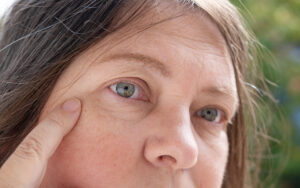Am I Experiencing A Retinal Migraine?

Retinal migraines are unique and rare types of migraines that lead to vision inferences in your eye before you start to experience the actual headache. The term is not associated with all migraines linked to visual symptoms, like auras.
It is also not the same as a migraine with aura and ocular migraine, even though the terms are sometimes used interchangeably. For starters, ocular migraine is when a headache leads to temporary vision changes. A migraine with aura leads to changes in vision in both your eyes.
Retinal migraines, alternatively, are more specific. It is a monocular condition, meaning it only affects one eye.
Symptoms of A Retinal Migraine
The exact number of people battling retinal migraines is still unknown. However, medical experts and professionals believe that not all cases are reported. If you suffer from certain medical complications, you might be at a higher risk of getting a retinal migraine.
Some of these medical conditions include;
- Lupus
- Atherosclerosis
- Sickle cell disease
Signs and symptoms of retinal migraines include;
- Scintillations (Seeing twinkling lights)
- Scotoma (Areas of reduced vision)
- Blindness or temporary loss of vision
- All the above occurring repeatedly.
If you have any or all of these symptoms, shut one for a few seconds and then the next for the same time to test them. For instance, with retinal migraines, if you shut the right eye and then look through the left, you may start to see twinkling lights.
However, if you shut the left eye and look through the right, you may have normal vision. Or vice versa.
The headache linked to retinal migraines starts within 50-60 minutes of your visual symptoms. However, this does not always have to happen. In addition, some people’s visual symptoms will not come with a headache.
If you notice signs and symptoms in both eyes, you probably do not have a retinal migraine. It is vital to ensure this before you move forward with any treatment.
Causes of Retinal Migraine
It is still unclear what causes retinal migraines. With that said, some medical experts and professionals believe that the narrowing of the veins and arteries in your eye might be what contributes to this type of migraine.
Another expert theory says that family history or genetics can play a huge role in developing retinal migraines. People who get retinal migraines might have the same triggers as those who get migraines with aura. Some of the more common triggers include;
- Hypertension (High blood pressure)
- Stress
- Smoking
- Bending over
- Hormonal contraceptive pills
- Low blood sugar
- Excessive heat
- Dehydration
Diagnosis
There is no actual set test that doctors use to diagnose retinal migraines. The doctor will review you and your family’s medical history. It is because usually, half of the people suffering from this type of migraine have people in their family tree with migraine issues.
The doctor will also conduct a physical examination, ask about the symptoms you are experiencing and attempt to rule out all the other things that may have caused them.
Most doctors normally use the ICHD-3 criteria rules and guidelines to help diagnose this condition. The diagnostic criteria for such migraines include;
- The patient must be experiencing attacks consistent with migraines with aura.
- The aura must only happen in one of your eyes without or with noticeable signs and symptoms like visual disturbances or blindness. It must also have spread gradually for about five minutes. You should have had a headache that began within an hour and symptoms that lasted 5 to 60 minutes.
In some scenarios, a specialist might have to come in to help determine whether the symptoms are because of a stroke or a severe eye disease.
Some people with visual disturbances may have hemianopsia or hemianopia. Hemianopia is vision loss in half of your vision field, typically happening on the same side. It is triggered by trauma or injury to the brain or a stroke.
Other conditions can cause temporary vision loss, like amaurosis fugax or TVL (transient vision loss). This is also sometimes referred to as an eye stroke.
If you are experiencing vision loss, talk to an eye doctor or physician immediately. Normally, vision loss in just one of your eyes is unrelated to this type of migraine. It might be a symptom of an even more severe condition, like the potential of a stroke occurring.
If it goes untreated, temporary vision loss because of a retinal migraine can sometimes become permanent.
Treatment
If your doctor diagnoses a retinal migraine, ask them what kind of treatment you should use. The “right” treatment varies from patient to patient, meaning there is no one-size-fits-all treatment.
If you do not experience retinal migraines often, your eye doctor might suggest you try to use over-the-counter NSAIDs, like aspirin, ibuprofen, and similar drugs, when an episode occurs. The doctor might also recommend:
- Calcium channel blockers, which help to help lower blood pressure
- Anti-nausea medication
- Anti-epileptic medications (to help prevent seizures)
- Tricyclic antidepressants (to help change the chemistry of your brain)
Most eye doctors do not subscribe to conventional migraine treatments like ergotamines or triptans for patients with retinal migraines.
Triptans, for instance, are not safe if you are at risk of suffering a stroke, which might be the case for patients experiencing temporary vision loss in one of their eyes.
Conclusion
Retinal migraines are benign medical conditions; their signs and symptoms usually last less than an hour. Although there is the potential of experiencing some vision loss, it is rare. Anybody with temporary vision loss or blindness experiencing migraines should talk to our eye doctor as soon as possible.
As you have seen above, the exact cause of this migraine is still unknown. However, hopefully, now you know what to look for when you think you might have a retinal migraine.
While the cause may be unknown, you can get treatment for your case after diagnosis from our doctor. Visit our clinic today if you think you have a retinal migraine. We will offer the best solution to preserve your vision and relieve pain.




